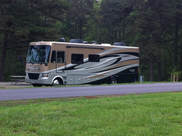 Tiffin Allegro Open Road Tiffin Allegro Open Road We are making a big change in our camping lifestyle. We have traded in our 2011 Allegro 35' Open Road Motorhome for a 2017 Winnebago Travato Van. We have loved the motorhome and all the places it has taken us, but we are ready to downsize and go on an adventure at a moments notice. Our last motorhome experience was a trip to New Jersey to visit with our children. We stayed at Turkey Swamp County Park in Freehold, NJ and it was difficult to maneuver the dirt roads getting into and out of the park. Driving the motorhome long distances has become a chore rather than a fun experience. In a 35' motorhome we missed being able to stop anywhere to take in the sites along the route. We returned home in July and put the motorhome in storage to begin the process of emptying to sell the RV. This was quite an undertaking and very similar to moving out of a sticks & bricks home. We were amazed at how much stuff we had accumulated and were carrying around with us. We then began the process of looking for a smaller RV to suit our needs. After much research and visiting dealerships we decided the Winnebago Travato 59K was best for our budget and lifestyle. Fortunately, we found a new 2017 at a local dealership and have completed paperwork. The Travato is being prepped and we are waiting for delivery. We are very excited and hopefully we will be able to park the van at home to use as our second vehicle. Our next blog will be all about stocking the Travato and taking off for a new adventure.
0 Comments
There is a timeless debate on whether or not to leave your grey valve open when hooked up to a sewer connection. I thought I would add my two cents.
Of course, you should always leave your black tank valve closed until the tank is full or at least 3/4 full. You should not skimp on water in the black tank because this water helps keep everything in your tank solvent. I think everyone agrees. The grey tank being open or closed seems to cause much controversy. Here's my take. During normal use the grey tank does collect some unwanted residue from dishwashing such as crumbs, food, soap scum and grease. Grease could potentially be the worst thing sitting in your tank. It can become insoluble and cake on the sides and bottom of the tank. It makes sense, if you leave the valve open, some grease will naturally drain with any liquids. It also makes sense some grease will solidify on the bottom of the tank and some will solidify around the valve. On the other hand, if you leave your valve closed, much of the grease will stay on top of the water some may solidify on top of the water once the water cools. Very little will accumulate around the valve area, but some will always cling to the sides. If you keep the valve closed, which is what I do, when you open it, the force of the water should wash most of the debris and grease out. If you leave it open, it would make sense to close it a day or two before emptying your black tank to flush your sewer hose. Once in awhile, you could partially fill your grey tank with warm water to liquefy any grease build up around the valve area. All that being said, one must remember, when leaving your valve open, you are leaving it open to the campground sewer. I have heard of instances of worms or bugs swimming past the pea traps and coming up through the kitchen sink. This is probably very rare, however, it seems very possible they could be swimming around in your tank. Why this doesn't happen at a bricks and sticks, I don't know. Of course we've all heard of the stories about rats and snakes coming through the sewer lines. Whether you choose to leave it open or closed, most RV'ers don't have a problem, open or closed. The argument for leaving it open seems to be one does not have to remember to open it every couple of days and face grey water coming through the shower drain. It could be a problem if you have a lot of people taking showers. I say it's a personal choice. Mike I know there are campers that prefer and expect total darkness at campgrounds, especially in national forests. That usually is not going to happen unless one is boondocking.
We all want to be good neighbors when camping so it would be courteous to keep this in mind when using lights. No one should be using the large industrial lights one might pickup at Home Depot. These are very annoying. Some of the lights that are on the exterior of RVs are blinding. If leaving these on, you may want to consider switching them out to a soft amber light. Some RVs come with bright lights on the front (usually some fifth wheels). All lights, if not needed, should be turned off at quiet time. If you have to keep your area lighted for safety or security reasons, invest in some solar spots and point them towards your RV. For those that prefer total darkness, keep in mind many RV'ers are older and need these lights for safety and security. If you are in your 60's, 70's and 80's and scramling out of your RV in the middle of the night, you need your steps and the area around your camper well lit. For both sides of this issue, please remember everyone has different needs and try to be courteous and understanding. 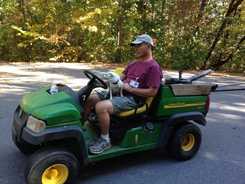 We previously talked about our camphosting experience at Bolding Mill CG on Lake Lanier in Gainesville, Ga. We cleaned bathrooms, campsites, blew off roads and helped campers with their problems. The hours were 20 hours a week per campsite. If one person worked 10 hours, it counted as 10 hours. If two persons from the same campsite worked 10 hours at the same time, it still only counted as 10 hours. Guess what, most of the time, only one of us worked. In spite of it being 95 degrees, we enjoyed ourselves, mostly because of the clients/campers and the fellowship with the other volunteers.The volunteers got together for cookouts and such. That being said, we probably won't volunteer in the heat of the summer again. Last September, we camphosted at Edisto Beach State Park. It's one of the barrier islands near Charleston, SC. It was twenty five hours per campsite. Five, five hour days. It was the same deal as Bolding Mill so I worked the twenty five hours by myself and left my significant other at the RV. The duties were about the same except we didn't have to clean bathrooms. The Rangers and other volunteers were very nice. There was very little interaction between volunteers. The volunteers did not have sewer. We won't do without sewer in the future. This experience reinforced our decision not to camphost during the summer in the South. The mosquitos were intolerable. We are now at Sawnee CG on Lake Lanier for the winter. So far, so good. We have had one cookout and we see the other volunteers often. The hours are as they should be. If we both work 5 hours together, we get credit for ten. All in all, camphosting has been a good experience. Next year, we may not camphost. We will travel more and spend all the money we saved! Thank you Mike Robinson Since we have finished our very first camphosting job, I decided to add, from a camp host's point of view, the following to our original blog about camping etiquette.
1. Don't flick your cigarette butts all over the site. This is just plain rude! As a former smoker, I can sympathize. My favorite alternative when there is no ashtrays is to twist the butt between your fingers until all you have is the filter. Put the filter in your pocket until you find a trash can. The next best alternative is throw your butts in the fire pit. 2. Don't leave trash all over you campsite and don't use the fire pit as your trash can. Yes, I know you say, what's the matter with burning the trash? Well nine times out of ten unburnt trash is under the ashes and pop tops, cans etc. do not burn (last time I checked). 3. Don't leave a fire unattended! This is just common sense! A burning ash can easily flutter to the ground and start the woods on fire. This goes for grills also. At the very least place a metal mesh barrier over the pit to keep big ashes from getting away. Please don't check out and leave a burning fire unattended. 4. Keep your site uncluttered. This is your temporary home, treat as such. Your neighbors don't want to see your dirty house.I know this is very difficult when camping with children and you have five bicycles, five wet towels, five swimming trunks, five skateboards - you get the picture. Just make the effort. 5. Read and follow the campground's rules. I am sure I will follow up on campground etiquette with part three in a latter blog! Thanks, Mike and Sherrian It is important to run your gas generator as often as the service manual recommends. This is usually one to two hours a month. Sometimes this is hard when your motorhome is in storage or you're staying at campsites where the noise will bother fellow campers. One time I went two months without cranking it and when I tried it just wouldn't turn over. After a friend played with the choke and throttle for fifteen minutes we finally got it to crank.
When using the great and mighty ethanol gas (don't get me started) and especially when this gasoline sits for a long time, it gums up your jets, gas lines and well in the generator (remember the same thing happens to your car). The easiest way to prevent much of this "gumming up" is to use non-ethanol gas. Seeing as how 99.9% of stations don't carry it, this is next to impossible. It was recommended to me, when ever you have to go long periods of time without running your generator (or car), use an ethanol treatment in your tank. I am using a product called Stabil and it seems to work. This treatment will help keep the lines clear. It is important to note, only use this treatment when really needed because overuse will result in premature deterioration of your gas lines. Recently during a strong thunderstorm, water seeped from under our bathroom cabinet. I went on the roof to try to determine where it was coming from and decided the leak was around the refrigerator vent or bathroom vent fan. Using Dicor self leveling caulk, I caulked around both and for good measure I caulked a seam down the length of the motorhome. It rained again and leaked again.
Next, we thought it may be coming from the bedroom slide. When I inspected the seals, we found a couple of possibilities so we closed the slide and waited for the next rain. With the slide close, it looked very tight. It rained again and leaked again! This time, thinking I didn't caulk the roof well enough, I re-caulked and let it dry throughly. Instead of waiting for the next rain, I went on the roof with the hose and blocked around the vents with towels so water wouldn't go anywhere except over the side. It leaked!! It just didn't seem right that it would leak after I did such a great job of caulking. I looked over the side of the motorhome and directly under where water ran down the side of the camper was the water heater enclosure. We ran water directly over the water heater and it leaked like a sieve. A little silicone caulk around the flange of the housing did the trick. It has not leaked during heavy rains in two weeks! In summary, the next time we have to find a leak, we will localize small areas, one at a time, until the leak appears. Thanks, Mike We've been camphosting here at Bolding Mill CG since June 3rd and learning the ins and outs of workcamping. The other hosts are great to work with and taught us what we needed to know for our very first camphosting job. We work 20 hours a week for our site which includes water, elec, sewer and laundry.
We still have plenty of time for hiking and biking taking advantage of being close to the north Georgia area. I've posted two hikes on our Hike and Bike Trails website. The Lake Zwerner Trail around the reservoir in Dahlonega was fun ending with lunch on the square. Last week we hiked the Raven Cliffs Falls Trail near Helen and loved seeing the waterfalls. We will be here until August 12th and then moving on to South Carolina for a job beginning on September 1st. We will be camphosting at Edisto Beach State Park and looking forward to a new adventure. We recently took the opportunity to hike around Lake Zwerner near Dahlonaga, Georgia. After visiting the Dahlonaga square, we thought a simple three mile hike would be ideal. Although the highs for the day would reach the mid 90's, since we were starting our hike about 11 am, we shouldn't have any problems. At the trailhead I asked a couple of young women if we needed our trekking poles and they said no, it was an easy hike.
The hike, as it turned out, was very strenuous, with steep inclines and declines on sometimes rocky surfaces. We had to stop and rest two times during just a three mile hike! Thank goodness we each had full Swells (water bottles) at the start. We ended the hike with one swallow of water left. We learned a few lessons. When asking someone about the difficulty of a hike, consider the age of the person you are asking. What may seem easy to a twenty something, is not the same as a sixty something. Also, consider the environment. We have spent the last two winters hiking in Florida. All the trails are flat! Dahlonaga is located in the foothills of the Appalachian mountain range. If you ask a local about the difficulty of a hike, remember they are used to this kind of hiking. In the future, we will make sure we have plenty of water, trekking poles and my knapsack with all our emergency supplies! We are in our sixties, but no matter what age, you should play it safe. By the way, although the hike was strenuous, it was a great hike with beautiful views of the lake. Afterwards, we made our way back to Dahlonaga for lunch at Shenanigans. The air conditioning felt soooo good! We recently took our motorhome to Camping World of Oakwood, Georgia to replace a leaking rear jack. The jack was less than a year old so it was warranted by the manufacturer, HWH.
Camping World kept our motorhome just shy of two months. This seems a little long just to replace a jack. During this time, I would check in with the service department and they would tell me they were waiting to hear back from HWH or they had to take pictures and send them to the manufacturer or they had to send them some other piece of information before HWH would send them the jack. There was always some kind of delay. After close to two months of this back and forth, I asked Camping World for their contact name and number at HWH and I would contact them to find out why there was such a long delay. Lo and behold, Camping World emailed me that afternoon to say my jack had arrived. What a coincidence! The jack was installed about 3 days later. When originally ordering this same jack at Lazy Days in Tampa, Florida, the jack came in one week. There were no pictures to be sent, just the motorhome information, model and serial number of the jack. I will let the reader draw their own conclusions. |
AuthorWe love to travel in our 2021 Coachmen Beyond van about half of the year. Join us, if you will, to see where our adventures take us. Archives
April 2021
Categories |
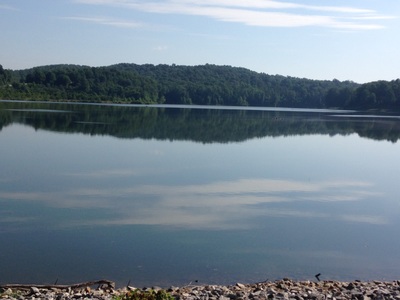
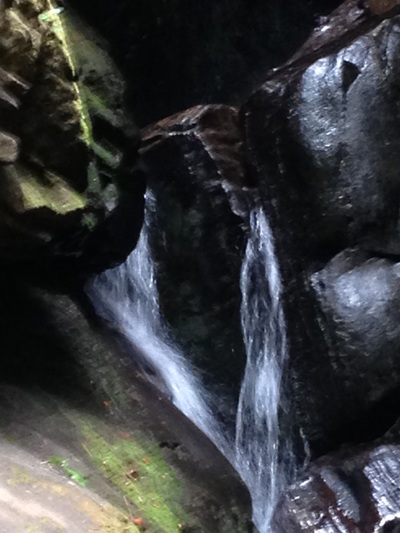
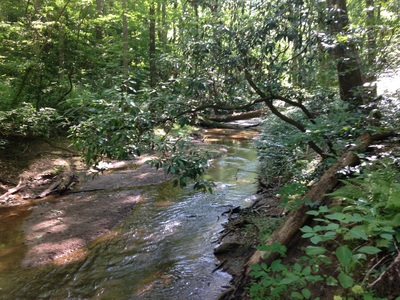
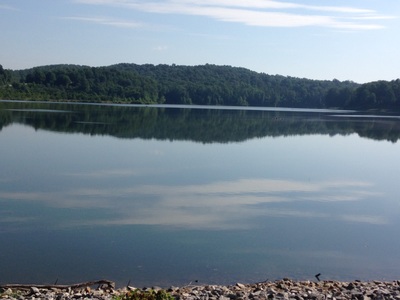
 RSS Feed
RSS Feed
